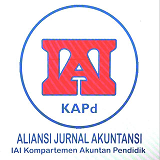PERAN ARTIFICIAL INTELLIGENCE DAN TATA KELOLA DALAM MENGATASI PENYELUNDUPAN PAJAK YANG MERUGIKAN NEGARA
Abstract
This study aims to determine what factors can cause tax evasion actions, both from the taxpayers themselves and government policies that have been implemented, including the possibility to implement artificial intelligence in the near furure dan good governance. The method used in this study is a descriptive method by using secondary data, data sourced from the literature with the aim of collecting relevant information and sources. Knowing the factors that cause tax evasion actions by conducting keyword searches, subject searches, scientific citation searches, books, scientific articles, research reports, sources, and documents related to research. The results of this study indicate that there are two main factors that cause tax evasion actions, namely the effectiveness of the implementation of the self-assessment system, and government policies in regulating the amount of applicable tax rates as a benchmark for the value of tax payments.
Keywords: Artificial Intelligence, Good Governance, Self Assessment System, Tax Evasion
Full Text:
PDFReferences
Anggraeni, I.Y. (2013). Faktor-Faktor yang Memengaruhi Kepatuhan Wajib Pajak terhadap Penerimaan Pajak Penghasilan pada Kantor Pelayanan Pajak Pratama Semarang Tengah Satu. Jurnal Ilmu Administrasi dan Bisnis. Vol. 2 No. 2. Hal.: 1 - 14
Braithwaite, V. (2016). Taxing Democracy: Understanding Tax Avoidance and Evasion. New York, USA. Routledge
Google Search, Tax Avoidance vs. Tax Evasion. https://www.google.com/search?q= tax+avoidance+vs.+tax+evasion&sxsrf
Halim, A., Bawono, I.R. & Dara, A. (2016). Perpajakan. Edisi 2. Jakarta. Salemba Empat.
Herryanto, Marisa, Toly, A.A. (2013). Pengaruh Kesadaran Wajib Pajak, Kegiatan Sosialisasi Perpajakan, dan Pemeriksaan Pajak terhadap Penerimaan Pajak Penghasilan di KPP Pratama Surabaya Sawahan. Jurnal Akuntansi dan Pajak. Vol. 1, No. 1. Surabaya
Hokamp, S., Gulyas, L., Koehler, M., & Wijesinghe, Sanith. (Eds.). (2018). Agent-Based Modeling of Tax Evasion: Theoritical Aspects and Computational Simulations. First Ed., New Jersey, USA, John Wiley & Sons Ltd
Ilyas, B., Burton. (2013). Hukum Pajak. Edisi 6. Jakarta. Salemba Empat
Istika, U.H. (2015). Pengaruh Kesadaran, Pengetahuan Pajak dan Sikap Wajib Pajak terhadap Kepatuhan Wajib Pajak Pekerjaan Bebas di KPP Pratama Semarang Timur. Universitas Dian Nuswantoro, Semarang.
Mardiasmo. (2013). Perpajakan. Edisi Revisi. Yogyakarta. Andi
Masri, I. Martani, D. (2012). Pengaruh Tax Avoidance terhadap Cost of Debt. Simposium Nasional Akuntansi XV. Banjarmasin.
McGee, R.W. (Eds.).(2012). The Ethics of Tax Evasion Perspectives in Theory and Practice. New York. Springer
McGill, R.K., Haye, C.A., & Lipo, S. (2017). G.A.T.C.A.: A Practical Guide to Global Anti-Tax Evasion Frameworks. Gewerbestrasse, Switzerland. Palgrave Macmillan
Ningsih, D. N.C., Pusposari, D. (2015). Determinan Persepsi Mengenai Etika Atas Penggelapan Pajak (Tax Evasion). Simposium Nasional Akuntansi
Palan, Ronen. (2010). Tax Havens: How Globalization Really Works (Cornell Studies in Money). Cornell University Press. Ithaca and London
Patton, Stewart (2017). Data Analysis Technique in Taxation. Palgrave Macmillan. Switzerland.
Peraturan Direktur Jenderal Pajak UU KUP No. 28 Tentang Ketentuan Umum dan Tata Cara Perpajakan, Direktorat Jenderal Pajak, Jakarta
Permatasari, I. (2013). Meminimalisasi Tax Evasion melalui Tarif Pajak, Teknologi dan Informasi Perpajakan, Keadilan Sistem Perpajakan, dan Ketepatan Pengalokasian Pengeluaran Pemerintah. Jurnal Ekonomi dan Bisnis. Universitas Diponegoro. Semarang
Permita, dkk. (2014). Pengaruh Persepsi Wajib Pajak Orang Pribadi atas Pelaksanaan Self Assessment System terhadap Tindakan Tax evasion. Jurnal Akuntansi dan Keuangan. Padang
Pohan, C.A. (2017). Pembahasan Komprehensif Pengantar Perpajakan: Teori dan Konsep Hukum Pajak. Edisi ke-2. Mitra Wacana Media. Jakarta
Rahayu, S.K. (2017). Perpajakan Indonesia: Konsep dan Aspek Formal. Rekayasa Sains. Bandung
Resmi, S. (2014). Perpajakan Teori dan Kasus. Edisi ke-8. Salemba Empat. Jakarta
Volkenburgh, van Brandon. (2021). Artificial Intelligence and Taxes: 10 Ways It’s Being Used. https://www.crowdreason.com/blog/artificial-intelligence-tax
Yuswohadi, Rahmat, Y. (2020). 2020 the Decade of AI: How Artificial Intelligence Will Kill Your Business (by 2030). Jakarta. Inventure Knowledge
DOI: https://doi.org/10.31326/tabr.v3i2.1494
Refbacks
- There are currently no refbacks.
View My Stats









